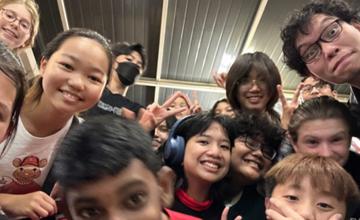Top 7 Tips To Write Amazing Stories

Mar 9, 2020
By Dev Dharmendran, Nexus Year 8 learner.
Children’s book author, Steve Skidmore who is also voted as one of the 100 most influential and creative people in the UK (2016), visited Nexus International School, Malaysia. He conducted writing masterclasses, where he went through seven tips with budding writers on how to write amazing stories.
Here are Skidmore’s top seven tips for aspiring authors.
Tip #1: Read, Read & Read
This may seem obvious, but “reading improves writing dramatically” says Skidmore. When we read, we are exposed to loads of ideas and various literary techniques which then helps improve our writing.
Tip #2: Magpie-ing
Do not feel afraid to copy. Good writers take ideas from other narratives and tweak them to fit their own story. It is completely alright to do this, so long as the content is cleverly twisted to prevent copyright issues.
Tip #3: Write Something You Know About
Write about things that you know. “You are the expert about yourself,” says Skidmore. There is nobody better in the world to write about experiences that have occurred to you, than you.
Your own life experiences could be the experience of the protagonist, antagonist or any character for that matter, in the story that you’re writing. Perhaps, more fabrications could be added to amplify the feelings the story aims to create.
Tip #4: Everything Needs To Match
Many great stories have used the weather to reflect emotions. For instance, sunny weather depicts happiness, strong wind means chaos and an uncontrollable situation, rainy means sad and fog usually depicts mystery.
Icy cold weather or snow generally reflects evil. Like in Chronicles of Narnia, the snow clad setting reflects the predicament of Jadis the White Witch’s invasion of Narnia.
Apart from that, writers have to be careful to match every character, theme, and setting to produce a story. Attention even has to be given to names to ensure they match the characters.
Tip #5: Magic 3
There’s an element of ‘three’ in most great stories, which Skidmore calls as the ‘Magic 3’. This is when a scenario repeats three times, in which the character fails or succeeds in the first two scenes and the exact opposite (which is the ending readers anticipate) happens in the third scene. The underlying reason to enrich a story with Magic 3 is to create suspense.
Apart from that, Magic 3 can also be used to reflect the conflicts which happen in the story. Most of the time, the main character faces three types of conflicts, namely internal, external and situational. Internal conflict is conflict within her/him, external conflict is a conflict with another character and situational conflict is a conflict with the world.

Tip #6: Foreshadow
Foreshadowing is the technique of hiding clues throughout the story. This gets the reader to anticipate what is going to happen next. What authors usually aim to do is to trick the readers to guess a possibility, and then twist it for the “Oh, I totally didn’t expect that!” emotion.
For example, in the Harry Potter series, JK Rowling took time until the seventh book to reveal that part of Voldermort’s soul was hidden in Harry in the form of a Horcrux (fragment of one’s soul).
However, throughout the series, fans were given clues about this. Among the clues include Harry being a Parseltongue (the ability to speak to snakes), Harry’s scar burning every time he wakes up from a nightmare and the sorting hat contemplating putting him into the Slytherin house.
Tip #7: Always Plan Your Ending
Steve says, “Plan the ending first before you embark upon writing a story. Without knowing where you’re headed, how are you going to plan how to get there?”
It’s like getting into your car and setting the destination point in your GPS first before beginning to drive.
Only when you know your ending, will you be able to insert elements of foreshadowing throughout your story, and this too prevents a writer from writing a bad ending to a story, like “I woke up, and everything was a dream.”

Dev Dharmendran is Nexus Year 8 learner.
Children’s book author, Steve Skidmore who is also voted as one of the 100 most influential and creative people in the UK (2016), visited Nexus International School, Malaysia. He conducted writing masterclasses, where he went through seven tips with budding writers on how to write amazing stories.
Here are Skidmore’s top seven tips for aspiring authors.
Tip #1: Read, Read & Read
This may seem obvious, but “reading improves writing dramatically” says Skidmore. When we read, we are exposed to loads of ideas and various literary techniques which then helps improve our writing.
Tip #2: Magpie-ing
Do not feel afraid to copy. Good writers take ideas from other narratives and tweak them to fit their own story. It is completely alright to do this, so long as the content is cleverly twisted to prevent copyright issues.
Tip #3: Write Something You Know About
Write about things that you know. “You are the expert about yourself,” says Skidmore. There is nobody better in the world to write about experiences that have occurred to you, than you.
Your own life experiences could be the experience of the protagonist, antagonist or any character for that matter, in the story that you’re writing. Perhaps, more fabrications could be added to amplify the feelings the story aims to create.
Tip #4: Everything Needs To Match
Many great stories have used the weather to reflect emotions. For instance, sunny weather depicts happiness, strong wind means chaos and an uncontrollable situation, rainy means sad and fog usually depicts mystery.
Icy cold weather or snow generally reflects evil. Like in Chronicles of Narnia, the snow clad setting reflects the predicament of Jadis the White Witch’s invasion of Narnia.
Apart from that, writers have to be careful to match every character, theme, and setting to produce a story. Attention even has to be given to names to ensure they match the characters.
Tip #5: Magic 3
There’s an element of ‘three’ in most great stories, which Skidmore calls as the ‘Magic 3’. This is when a scenario repeats three times, in which the character fails or succeeds in the first two scenes and the exact opposite (which is the ending readers anticipate) happens in the third scene. The underlying reason to enrich a story with Magic 3 is to create suspense.
Apart from that, Magic 3 can also be used to reflect the conflicts which happen in the story. Most of the time, the main character faces three types of conflicts, namely internal, external and situational. Internal conflict is conflict within her/him, external conflict is a conflict with another character and situational conflict is a conflict with the world.

Tip #6: Foreshadow
Foreshadowing is the technique of hiding clues throughout the story. This gets the reader to anticipate what is going to happen next. What authors usually aim to do is to trick the readers to guess a possibility, and then twist it for the “Oh, I totally didn’t expect that!” emotion.
For example, in the Harry Potter series, JK Rowling took time until the seventh book to reveal that part of Voldermort’s soul was hidden in Harry in the form of a Horcrux (fragment of one’s soul).
However, throughout the series, fans were given clues about this. Among the clues include Harry being a Parseltongue (the ability to speak to snakes), Harry’s scar burning every time he wakes up from a nightmare and the sorting hat contemplating putting him into the Slytherin house.
Tip #7: Always Plan Your Ending
Steve says, “Plan the ending first before you embark upon writing a story. Without knowing where you’re headed, how are you going to plan how to get there?”
It’s like getting into your car and setting the destination point in your GPS first before beginning to drive.
Only when you know your ending, will you be able to insert elements of foreshadowing throughout your story, and this too prevents a writer from writing a bad ending to a story, like “I woke up, and everything was a dream.”

Dev Dharmendran is Nexus Year 8 learner.


